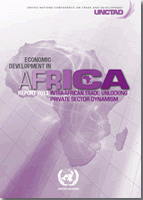
Intra-African trade presents opportunities for sustained growth and development in Africa. It has the potential to reduce vulnerability to global shocks, contribute to economic diversification, enhance export competitiveness and create employment.
African Governments have made several attempts to exploit this potential of regional trade for development, the most recent being the decision by African leaders at the African Union summit in January 2012 to boost intra-African trade and fast-track the establishment of a continental free trade area.
Against this background, the Economic Development in Africa Report (EDAR) 2013, subtitled Intra-African Trade: Unlocking Private Sector Dynamism focuses on how to strengthen the private sector to boost intra-African trade.
The report provides some facts on intra-African trade and highlights distinctive features of Africa’s enterprise structure that have to be addressed to promote intra-African trade. It also examines the challenges for intra-African trade posed by non-implementation of regional trade agreements and provides new insights into how to enhance implementation of existing regional agreements.
The report argues that for African countries to reap expected gains from intra-African trade and regional integration, they will need to place the building of productive capacities and domestic entrepreneurship at the heart of the policy agenda for boosting intra-African trade. In this context, the report recommends that African Governments should promote intra-African trade in the context of developmental regionalism.
In particular, it stresses the need for a shift from a linear and processbased approach to integration, which focuses on elimination of trade barriers, to a more development-based approach to integration, which pays as much attention to the building of productive capacities and private sector development as to the elimination of trade barriers.


